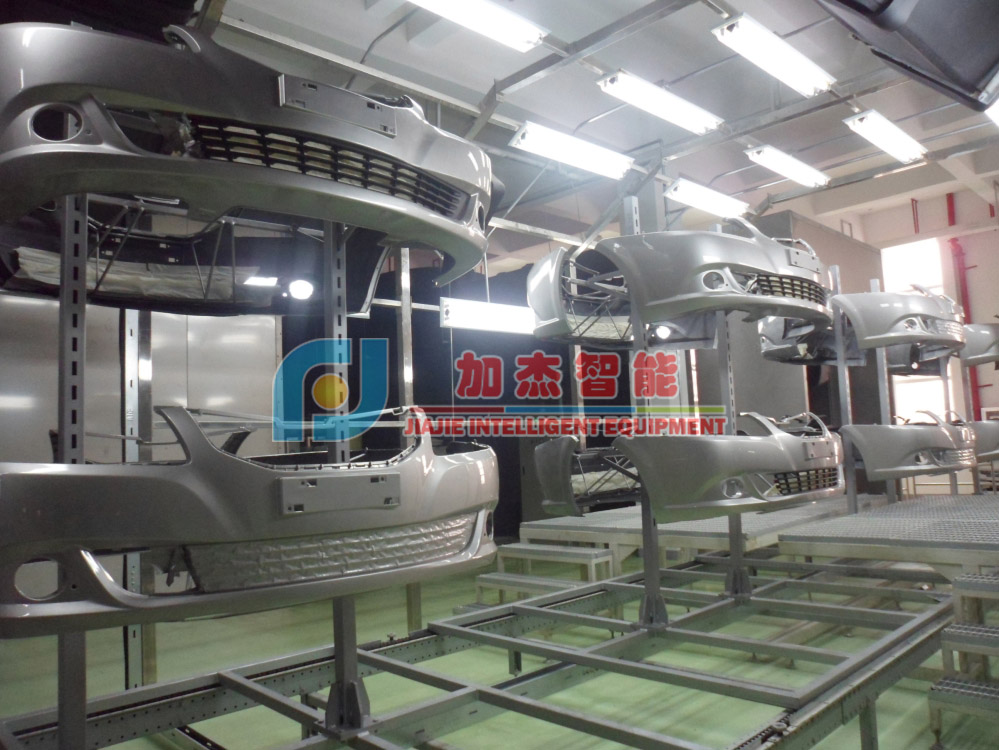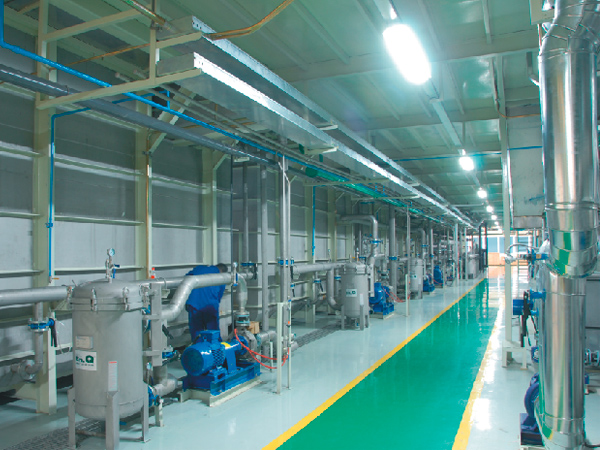Abstract: In view of the more and more extensive application of automobile coating line water-based coating process, the application and equipment requirements, equipment selection and configuration of automobile coating line transfer and blending system water-based coating were described.
Key words: transfer and blending; Waterborne coatings; Low shear; Voltage regulator
preface
To promote car coating of environmental protection of cleaner production, reduce the VOC (volatile organic compounds) emissions, the application of waterborne coatings will gradually replace solvent-based coating in automobile coating process and become mainstream, as the coating to meet the demand of the equipment, the traditional solvent-based paint coating equipment, such as: the robot spraying system, lose paint system, pre drying equipment, air conditioning and refrigeration dehumidification equipment, spray paint room, paint waste processing equipment must change accordingly. As the conveying, pressure regulating and temperature regulating equipment of paint coating, the paint transferring system (centralized circulation paint supplying spraying system) needs to change the details of a number of equipment, including voltage regulator, paint conveying pump, back pressure valve and agitator, in order to realize the stable quality of waterborne paint coating.
1. Application characteristics of waterborne coatings
1.1 foam
In foamability respect, water and solvent are similar, it is very difficult to bubble originally, even if bubble also can disappear immediately, but in composition of coating of water character, added the interface active agent that is dispersive for improving resin and joins, suffer its influence, the bubble that coating of water character produces becomes stable not easy disappear. In terms of the equipment, the shape design of the agitator and the speed setting of the agitator should be considered.
1.2 viscosity
Water-based coating than the traditional solvent coatings viscosity is high 20 ~ 30s, paint viscosity, poor fluidity, the choice of the pump to have power requirements (see Table 1).
Table 1 Comparison of water-based coatings and solvent based coatings

1.3 Surface tension
The surface tension of water-based coatings is greater than that of solvent coatings, the latent heat of evaporation is much higher than that of solvents, and the conductivity is also high. Due to its great conductivity, it is easy to have electric corrosion reaction, which will easily lead to the oxidation and rust of the pipeline of paint conveying and mixing equipment (see Table 2).
Table 2 Comparison of characteristics of water and solvent

Water - based coatings on the transfer system requirements
According to the application characteristics of water-based coatings, the application of water-based coatings has the following requirements for the transfer and transfer system equipment (compared with solvent-based coating equipment) :
(1) Due to the conductivity of waterborne coatings is easy to electric corrosion reaction, easy to the equipment oxidation, rust, in order to prevent equipment and pipeline corrosion, reduce the rust stain into debris mixed with the coating to form particles, all parts of the contact with waterborne coatings material must be SUS stainless steel material. Traditional carbon steel pump can not be used, pipelines consider SUS304 and above profiles, most of the domestic water-based paint manufacturers use stainless steel 304, 304L, some new coating line use SUS316.
(1) Different kinds of metal materials should not be used in piping to prevent electrical corrosion caused by potential difference generated by different materials.
(2) Avoid the air entering the fluid and stratification caused by the vortex of the agitator in the process of coating stirring.
(3) Low shear design is required for the whole system, including agitator mixing, pipe bending, voltage regulator, filter, etc.
(4) Due to the strict requirements of waterborne coatings on construction temperature and humidity, the temperature control accuracy of the paint transfer system is required to be within (23±0.5) ℃, all pipelines shall be insulated, the insulation material thickness shall be ≥12.5mm, and the pump body shall be insulated, etc..
(5) as a result of water-based paint cleaner main composition is pure water and a small amount of hydrophilic solvents, so you need to add pure water supply device to replace the solvent conveying system, water supply device at the same time need to each stage after tube in tube temperature control, in traditional solvent-based coating solvent conveying equipment, solvent needed and tube in tube heat exchange system.
(6) Due to the high viscosity of waterborne coatings, the paint transfer system needs to improve the conveying capacity of the pump. The flow rate of solvent paints in the circulation system is required to be 0.3 ~ 0.7m/s, while that of water-based paints is required to be 0.15 ~ 0.4m/s.
(7) More detailed cleaning steps are required for waterborne coatings before the production of the paint transfer and blending system: cleaning diluent → hydrophilic diluent → resin cleaning → pure water washing.
Equipment configuration of water-borne paint transfer system
3.1 Cycle mode
The circulating mode of water-borne paint transfer system usually adopts two-line circulation. Circulation system of line two gun stand design does not need stove wall paint, one of the three wire system of pressure regulator, by using a voltage regulator or gun gun Y joints to control the flow of spray gun, reduces the voltage regulator Settings of the shear force produced by coating, piping components is relatively small at the same time, system, convenient cleaning, such as color change in domestic coating production line, the most common. In some foreign factories, the three-line paint circulation system is flexible and easy to expand. The system is usually adjustable with high pressure, flow rate and circulation rate. It is also widely used in waterborne coatings.
3.2 paint pump
According to the dynamic model can be divided into pneumatic pump, hydraulic pump, electric pump, domestic automobile manufacturers no electric pump application examples, the vast majority of manufacturers adopt pneumatic pump and hydraulic pump, pneumatic pump application of waterborne coatings is both useful and helpful hydraulic pump, such as dongfeng Honda water-based coating paint using pneumatic pump, jianghuai new cars line coating adopts hydraulic pump, chery painting line 4 hydraulic pump is used to satisfy the requirement of the coating of ability in conveying, pneumatic pump should consider the sensitivity of exhaust pollution and water-based coating of shrinkage problem. According to the structure is divided into plunger type, centrifugal, piston type, in view of the stability of the plunger pump and low shear force, adapt to the viscosity of the wide range of advantages, its most widely used, the selection of the plunger pump needs to determine the flow of the pump, can be calculated according to the following formula.
3
Type:
D -- Cross section diameter of paint pipe, cm;
Hv -- volume per piston stroke, L;
V -- flow rate, m/s;
N -- number of strokes, 1/min.
At the same time, the flow rate of water-based coatings is slower than that of solvent coatings, and the requirement is 0.15 ~ 0.4m/s. For waterborne coatings, the pump pump continuous working pump reciprocating frequency between 12 ~ 20cpm (cycle per minute) is the best.
Table 3 Comparison of various pump applications

FIG. 1 Diaphragm voltage regulator
3.4 blender
The agitator is divided into pneumatic agitator and electric agitator. Compared with the electric agitator, the pneumatic agitator has better economy, and the speed of the agitator can be conveniently adjusted manually by controlling the air inflow. To make agitator can play a good stirring effect, the most important thing is to make the paint tank without dead Angle, therefore, the choice of agitator blade diameter and shaft length must be designed according to the diameter and height of the paint tank. At the same time, the mixing speed of agitator affects the effect of paint mixing, stirring speed too fast, can cause damage to coating shear and water-based coating performance, also can make the paint tank produce vortex which affects the coating uniform consistency, slow agitation can make the rate of movement of the coating of the tank is not enough, can also cause coating of precipitation. For waterborne coatings, a low shear agitator should be used. Common agitators are shown in Figure 2.

FIG. 2 Schematic diagram of agitator
3.5 paint
The paint can is divided into circulating cans and paint mixing cans. In view of the fact that the water-based paint provided by the paint manufacturer has already adjusted the viscosity and auxiliary agent before leaving the factory, there is no need to remix the paint on the coating line. Some water-based paint coating lines are not only equipped with paint mixing cans, which saves certain cost and investment and is relatively common in Japanese automobile enterprises. Paint tank shall be made by stainless steel electrolytic polishing process with passivation treatment. The surface roughness Ra is lower than 0.1, has good surface finish and corrosion resistance, ensures that the inner wall of the tank is not easy to hang paint, and reduces the possibility of skin formation of waterborne coatings; The sealing structure of the barrel body and the barrel cover has good sealing, effectively preventing the accidental entry of dust particles. The barrel cover of paint can has flat top type and dome type. Some water-borne paint production lines adopt flat top type structure and some adopt dome type structure. Recently, some companies in China have developed dome-type paint bucket, which is specially designed for waterborne coatings and is fully sealed with special structure. It can minimize the loss of volatile components and reduce the skin of waterborne coatings. Special attention should be paid to the backflow pipe design of waterborne coatings. When the coating returns from the tank top, it should enter the tank through the guide pipe to prevent the splash and bubbles of waterborne coatings, and prevent the bad influence of the splash and the coating attached to the tank wall on the overall performance of the coating. The best way is to design side bottom reflux.
3.6 Back voltage regulator
The back pressure regulator is an important component of the paint transfer system. It is used to control the pressure in the pipeline of the system to meet the needs of spraying parameters. The most commonly used are low-shear type and non-low-shear type. The traditional ball type and seat type regulator can shear the waterborne coatings as they pass through the ball type and ball type, for waterborne coatings a low shear type back pressure is required.
3.7 Filter and piping system
The filter is divided into bag filter and filter core filter. The filter should be made of stainless steel. The oscillating filter is better for water-based metal coating. In the flow selection, the large flow filter to the water - based paint shear force is the least, it is recommended to choose. The pipeline of the paint transfer system should consider profiles SUS304 and above, 304L and 316 are recommended. At the same time, the more smooth the inner wall of the pipe is better, the joint can be used sanitary joint or sleeve joint, should not use threaded joint, the inner diameter of the joint and the pipe should be kept consistent, pipe turning and lifting as little as possible, turning radius needs to be more than 6 times the diameter of the pipe, in order to reduce pressure loss and sedimentation.
4 conclusion
On the application of waterborne coatings, lost in addition to the main equipment in the paint mixing system, also cannot ignore other details, such as: given the strict construction temperature and humidity range, water-based coatings in coating of temperature control system should be chosen on the pipe in the pipe system, temperature control precision (23 + / - 0.5) ℃, water jacketed way of heat transfer is not easy to control, temperature control precision is not adopted Suggestions. Since the cleaning solvent of water-based coating is the ratio of DI pure water and hydrophilic solvent, it is necessary to add a conveying system for DI pure water tank and hydrophilic solvent tank. In order to improve the mixing accuracy, an automatic mixing system can be set up between the two tanks. At the same time, part of the strict control requirements of the production line, the addition of water-based paint pH monitoring system. The equipment and quality of the paint transfer system will directly affect the coating quality of the spraying body. The application of water-based paint in the paint transfer system requires a deep exploration in the details of equipment design and selection.

























 客户服务热线
客户服务热线

